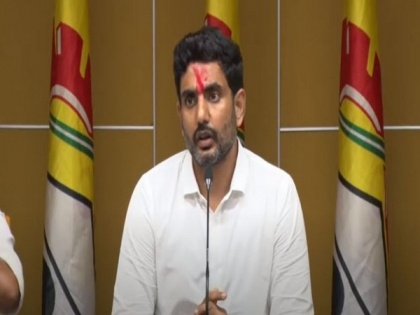Such tax regime would destroy country's indigenous textile sector: TDP leader urges Sitharaman to exempt handloom sector from GST regime
By ANI | Published: March 5, 2022 07:34 PM2022-03-05T19:34:16+5:302022-03-05T19:45:03+5:30
TDP National General Secretary Nara Lokesh on Saturday wrote to Union Finance Minister Nirmala Sitaraman and urged her to exempt the handloom sector from the GST regime.

Such tax regime would destroy country's indigenous textile sector: TDP leader urges Sitharaman to exempt handloom sector from GST regime
TDP National General Secretary Nara Lokesh on Saturday wrote to Union Finance Minister Nirmala Sitaraman and urged her to exempt the handloom sector from the GST regime.
In a letter to the Union Finance Minister here, Lokesh stressed the need for the union government to seriously consider exempting the handloom sector from GST altogether in the upcoming GST Council meeting.
"In Andhra Pradesh, over 65 lakh people were dependent on the handloom sector directly or indirectly. There were about 3.3 lakh handlooms in the state, with 16 lakh weavers, spinners, and workers involved in this trade. Since independence, no government has levied taxes on this sector till now. In 2017, when the GST rates were first imposed on textiles, the then TDP government urged the Centre against such a move," he wrote in his letter further stating that the addition of extra 25 per cent tax on the raw materials has "added to the burden."
"Such a tax regime would destroy the country's indigenous textile sector altogether," he wrote.
Lokesh said in the past two years, he had interacted with hundreds of weavers across Andhra Pradesh.
"A constant complaint from most of them was how the state government oversaw a drastic cutback of subsidies, welfare benefits, loan support, thrift fund interest rates, and buying of their products through APCO (Andhra Pradesh State Handloom Weavers Cooperative Society)," he wrote.
Lokesh said that with a higher tax "burden" and rising input costs, the production and marketing costs for such labour-intensive products would become "unmanageable".
"This becomes especially important now when weavers have been deeply hurt economically due to the Covid-19 pandemic. The government must recognize their dire situation due to lack of demand and destruction of supply chains. Products worth crores of rupees have remained unsold," he wrote.
( With inputs from ANI )
Disclaimer: This post has been auto-published from an agency feed without any modifications to the text and has not been reviewed by an editor
Open in app